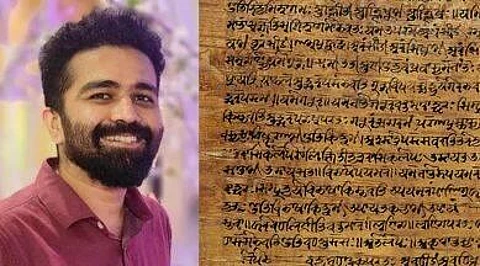

Rishi Rajpopat, an Indian student studying abroad, is being talked about everywhere after achieving a feat that remained outstanding for over two millennia. Rishi who is a 27-year-old lad did an amazing piece of work that is being discussed in the country and in abroad as well.
Rishi Rajpopat aka Rishi Atul Rajpopat was born in 1995 and is currently pursuing his Ph.D. in the Asian and Middle Eastern Department at St. John's College, University of Cambridge.
Rishi has scripted history by becoming the first person to solve a 2500-year-old text, Rishi Rajpopat has decoded the grammar text of Panini, the great Sanskrit scholar of ancient India (Sanskrit Puzzle Solved). These texts are more than 2500 years old. Even the Sanskrit scholars of the 5th century BC could not solve it.
Indian student Rishi is currently doing a Ph.D. at Cambridge University. After trying to solve this puzzle for 9 months, the sage had made up his mind to give it up. For about 1 month, I closed my books and devoted my mind to swimming, cycling, cooking, prayer, and meditation.
But when I came back and opened the titles, I started to understand this pattern automatically. Two years later, Rishi argued in his dissertation that the metarule of word formation was misunderstood. By this rule, Panini meant that the reader should choose the rule which is right to frame a sentence.
Panini's grammar, known as the Astadhyayi, relied on a system that functioned like an algorithm. Feed in the base and suffix of a word and it should turn them into grammatically correct words and sentences through a step-by-step process. However, two or more of Panini's rules often apply simultaneously, resulting in conflicts.
Panini taught a "metarule", which is traditionally interpreted by scholars as meaning "in the event of a conflict between two rules of equal strength, the rule that comes later in the grammar's serial order wins". However, this often led to grammatically incorrect results.
"My student Rishi has cracked it - he has found an extraordinarily elegant solution to a problem that has perplexed scholars for centuries. This discovery will revolutionize the study of Sanskrit at a time when interest in the language is on the rise," said professor Vincenzo Vergiani, Sanskrit professor and Rajpopat's Ph.D. supervisor.